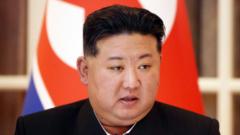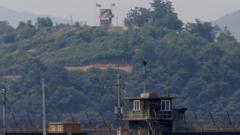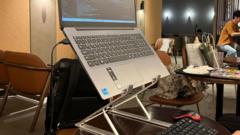**As military exercises intensify, the escalation in North Korea raises concerns over inter-Korean relations and regional security.**
**North Korea's Latest Missile Test Heightens Tensions Amidst Military Drills**

**North Korea's Latest Missile Test Heightens Tensions Amidst Military Drills**
**State media reports successful launch of advanced air defense missiles by Kim Jong Un, escalating regional unease.**
North Korean state media has announced that leader Kim Jong Un supervised a new missile test, involving the launch of two advanced air defense missiles said to possess "superior combat capability" and utilize "unique technology." The Korean Central News Agency (KCNA) reported that the test, conducted on Saturday, demonstrated the projectiles’ effectiveness in targeting various aerial threats, including drones and cruise missiles.
This military development comes shortly after South Korea reported firing warning shots at North Korean soldiers who briefly crossed into the Demilitarized Zone (DMZ), aggravating already heightened tensions. United Nations Command confirmed that around 30 North Korean troops crossed this heavily fortified border, prompting accusations from Pyongyang regarding South Korea's supposed "deliberate provocation."
The rising military activities coincide with ongoing large-scale joint exercises by South Korea and the United States. These drills began on Monday and have sparked condemnation from Kim Jong Un, who characterized them as "most hostile and confrontational." The newly-elected South Korean President Lee Jae Myung is expected to discuss these issues with US President Donald Trump during their upcoming summit in Washington. Despite Lee’s campaign promises to enhance inter-Korean relations, Kim’s sister has dismissed any reconciliation efforts from Seoul.
Earlier this month, Kim underscored his intention to escalate North Korea's nuclear arsenal, reiterating threats against perceived external adversaries. The country's missile capability has been a focal point of international concern, notably following North Korea's January announcement of testing an intermediate-range ballistic missile featuring a hypersonic warhead. Speculations also circulate regarding the potential exchange of missile technology between North Korea and Russia, though the exact implications of the latest test remain uncertain.
As the divide between South and North Korea persists, having begun with the Korean War in 1953, the geopolitical climate remains fraught with tensions and the threat of military confrontation.
This military development comes shortly after South Korea reported firing warning shots at North Korean soldiers who briefly crossed into the Demilitarized Zone (DMZ), aggravating already heightened tensions. United Nations Command confirmed that around 30 North Korean troops crossed this heavily fortified border, prompting accusations from Pyongyang regarding South Korea's supposed "deliberate provocation."
The rising military activities coincide with ongoing large-scale joint exercises by South Korea and the United States. These drills began on Monday and have sparked condemnation from Kim Jong Un, who characterized them as "most hostile and confrontational." The newly-elected South Korean President Lee Jae Myung is expected to discuss these issues with US President Donald Trump during their upcoming summit in Washington. Despite Lee’s campaign promises to enhance inter-Korean relations, Kim’s sister has dismissed any reconciliation efforts from Seoul.
Earlier this month, Kim underscored his intention to escalate North Korea's nuclear arsenal, reiterating threats against perceived external adversaries. The country's missile capability has been a focal point of international concern, notably following North Korea's January announcement of testing an intermediate-range ballistic missile featuring a hypersonic warhead. Speculations also circulate regarding the potential exchange of missile technology between North Korea and Russia, though the exact implications of the latest test remain uncertain.
As the divide between South and North Korea persists, having begun with the Korean War in 1953, the geopolitical climate remains fraught with tensions and the threat of military confrontation.















